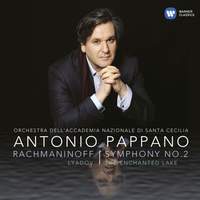Recording of the Week,
Rachmaninov's Second Symphony
There has been no shortage of recordings from conductor Antonio Pappano recently. Following his hugely successful discs of Rossini’s and Pergolesi’s Stabat Maters (both with Anna Netrebko) and a DVD of Verdi’s Simon Boccanegra from the Royal Opera House (with Plácido Domingo), his latest release turns to the orchestral repertoire with a new disc of Rachmaninov’s Second Symphony recorded live in Rome back in 2009 with his own orchestra – The Orchestra dell’Accademia Nazionale di Santa Cecilia.

Rachmaninov’s music is highly emotional and speaks very directly to the listener. Some people dismiss it as being too shallow and self-indulgent, citing the fact that it is frequently used in films to portray moments of tenderness or melancholy as evidence of this (an obvious example being his Second Piano Concerto in Brief Encounter). But I don’t see any problem with music being emotionally direct and without doubt his Second Symphony is a perfect example – full of heart-felt lyricism and an inexhaustible stream of melody.
There was a ten-year gap between his First Symphony (premiered in 1897) and this one. That was probably partly due to the disastrous reception that his first symphony received, attracting fierce criticism and sending the young composer into a bout of depression. However he recovered over the following years and after resigning from the conducting position at the Bolshoi in 1906 he spent the following three winters in Dresden. Here Pappano suspects that he must have heard quite a bit of Wagner, as in his Second Symphony (written 1907):
“there are so many Tristanesque chromatic progressions which build ‘from within’ in spectacular fashion, and certainly one or two obvious Meistersinger references.”
The symphony was premiered under the baton of the composer in 1908. It was a success and earned the composer the coveted Glinka Award. But because of its length it soon became normal to perform it with savage cuts, often reducing it from nearly an hour to just 35 minutes. This did the work no favours as the musical balance of the symphony is based on long melodic lines, which need time to grow naturally. Without these the work isn’t nearly as good. The big revival towards performing the work in its entirety (as it is almost always heard today) was in no small part thanks to the London Symphony Orchestra and André Previn who really championed the work in 1970s, touring to Russia amongst other places and making a now legendary EMI recording in 1973 which is the one which I (and I imagine countless others) grew up on.
This music is unashamedly lyrical and beautiful, and in this new recording the orchestra play with unrivalled passion and commitment. The upper strings soar and sing beautifully through the longest of phrases, while the lower strings offer the necessary guts when required. The woodwind phrase beautifully and the brass cut through to thrilling effect at key moments in the finale. The long and haunting clarinet solo in the slow movement melts even the toughest hearts, and is here performed exquisitely by the orchestra’s Principal Clarinettist Alessandro Carbonare.
Pappano carefully observes Rachmaninov’s numerous markings in the score to provide wonderful clarity and balance throughout, but it never sounds in any way academic, but evolves entirely naturally with real passion and makes a dramatic impact. It is accompanied on the disc by Liadov’s short but beautiful The Enchanted Lake which is an equally fine performance. Thoroughly recommended.
Orchestra dell’Accademia Nazionale di Santa Cecilia, Antonio Pappano
Available Formats: MP3, FLAC



